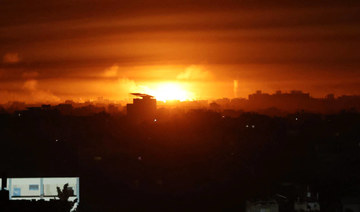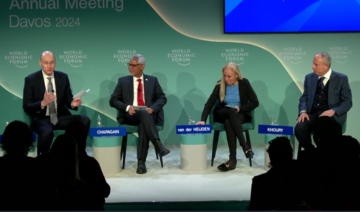NEW YORK CITY: Independent UN experts on Tuesday warned that Gazans now account for 80 per cent of all people facing famine or catastrophic hunger worldwide. It came as they highlighted the unprecedented humanitarian emergency in the Gaza Strip in the face of the ongoing Israeli assault on the besieged enclave.
“Currently, every single person in Gaza is hungry, a quarter of the population are starving and struggling to find food and drinkable water, and famine is imminent,” said the group of human rights experts.
A lack of sufficient nutrition and healthcare is endangering the lives of pregnant women and their unborn children, they added, and all children under the age of five, about 335,000 in total, are highly susceptible to the effects of severe malnutrition as the threat of famine continues to grow.
The experts expressed concern that an entire generation is at risk of stunting, a condition in which insufficient nourishment hinders the growth and development of young children, leading to irreversible physical and cognitive impairments, posing a significant threat to learning capacity.
The group of experts included Francesca Albanese, the UN’s special rapporteur on the situation of human rights in the Palestinian territories occupied since 1967; Reem Alsalem, the special rapporteur on violence against women and girls; Pedro Arrojo Agudo, the special rapporteur on the human rights to safe drinking water and sanitation; and the special rapporteurs on the right to food, the right to education, the right of everyone to the enjoyment of the highest attainable standard of physical and mental health, the right to adequate housing, and the human rights of internally displaced persons.
They said that “nowhere is safe in Gaza” since Israel’s “total siege” of the territory began on Oct. 9, depriving 2.3 million Palestinians of water, food, fuel, medicine and other medical supplies, “this against the backdrop of a 17-year Israeli blockade, which before this war made approximately half of the people in Gaza food insecure and more than 80 percent reliant on humanitarian aid.”
Most of the aid deliveries during the conflict to date have been concentrated in southern Gaza. As of Jan. 1, only five of 24 scheduled shipments of relief supplies, including food, have been delivered to regions north of Wadi Gaza.
Concerns have grown among the experts about the deteriorating conditions in northern Gaza in particular, where residents are experiencing prolonged food shortages and severely limited access to essential resources.
In southern Gaza, meanwhile, large numbers of displaced people are living in inadequate shelters or areas lacking basic amenities, which is exacerbating the problems created by already harsh living conditions.
“It is unprecedented to make an entire civilian population go hungry this completely and quickly,” the experts said. “Israel is destroying Gaza’s food system and using food as a weapon against the Palestinian people.”
They accused Israel of destroying or blocking access to farmland and the sea, saying that soldiers have razed 22 percent of agricultural land and facilities in the territory, including orchards and greenhouses in Northern Gaza, and destroyed 70 percent of Gaza’s fishing fleet.
“Even with what little humanitarian aid that has been allowed to enter, people still lack food and fuel to cook,” the experts said. “Most bakeries are not operational, due to the lack of fuel, water and wheat flour, along with structural damage.
“Livestock are starving and unable to provide food or be a source of food. Meanwhile access to safe water continues to diminish, while the healthcare system has collapsed due to the wide-spread destruction of hospitals, significantly heightening the spread of communicable diseases.”
Israeli forces have destroyed more than 60 percent of Palestinian homes in Gaza, they added, affecting the ability of families to cook and causing “domicide through the mass destruction of dwellings, making the territory uninhabitable.”
The UN Office for the Coordination of Humanitarian Affairs estimates that nearly 85 percent of Gaza’s population, amounting to about 1.9 million people, is internally displaced, including many who have been forced to move several times in search of safety.
“We have raised the alarm of the risk of genocide several times, reminding all governments they have a duty to prevent genocide,” the experts said.
“Not only is Israel killing and causing irreparable harm against Palestinian civilians with its indiscriminate bombardments, it is also knowingly and intentionally imposing a high rate of disease, prolonged malnutrition, dehydration and starvation by destroying civilian infrastructure.
“Aid needs to be delivered to Gazans immediately, and without any hindrance, to prevent starvation.”
They continued: “Our alarm for the unfolding genocide does not only refer to the ongoing bombardment of Gaza but also concerns the slow suffering and death caused by Israel’s long-standing occupation, blockade and current civic destruction, since genocide advances through an ongoing process and is not a singular event.
“The clear path to achieving peace, safety and stability for both Israelis and Palestinians lies in the realization of Palestinian self-determination. This can only be achieved through an immediate ceasefire and the cessation of the Israeli occupation.”
Special rapporteurs are part of what is known as the special procedures of the UN Human Rights Council. They are independent experts who work on a voluntary basis, are not members of UN staff and are not paid for their work.


























